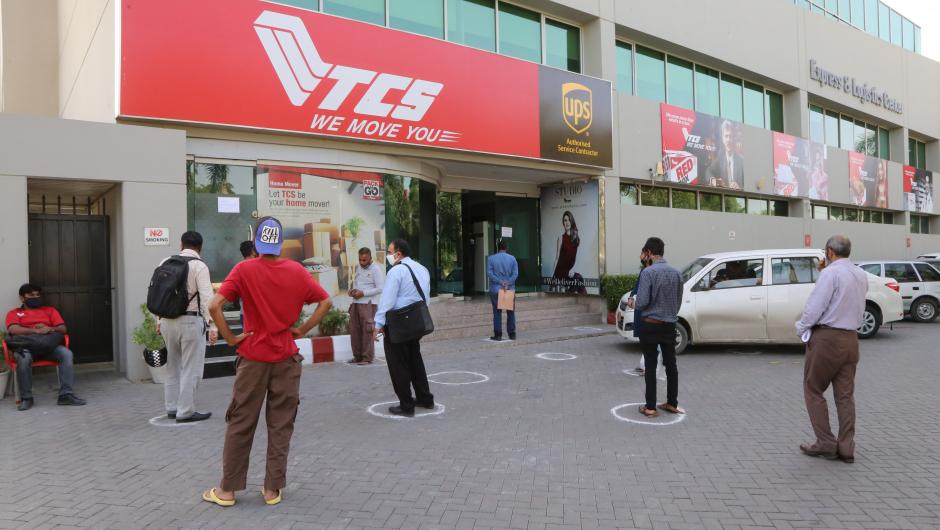Covid-19: Bane or Boon for the Logistics Industry in Pakistan

According to a report by the Asian Development Bank (ADB), the coronavirus pandemic could cost Pakistan’s economy anything between USD 16.387 million and 4.95 billion, which is approximately equivalent to 0.01 % to 1.57 % of its current Gross Domestic Product (GDP). Additionally, there is a threat that the crisis could trigger a loss of 946,000 jobs. Pakistan already has 50 to 60 million people living below the poverty line and Covid-19 is estimated to further push this number to 125 million.
While most things seem to be headed south, Pakistan has a few trumps going for it. Social barriers are breaking and the gap between public and private sector seems to be closing. The government has announced relief packages for the economically vulnerable, along with relaxation on utility payments for three months. However, the government is not working alone, textile manufacturers have shifted operations to produce masks and protective suits for healthcare professionals, and charity organizations are running donation drives for food, soaps, PPEs and masks.
Pakistan struggles with innovation and entrepreneurship but has seen significant initiatives in the past few weeks. Hospitals have established online clinics and groceries are home-delivered, while keeping up with sterilization directives issued by local governments. Engineers are developing prototypes for ventilators, innovation is being encouraged and appreciated.
Logistics and Transport: Rebuilding Opportunities
Government of Pakistan’s decision to impose a nationwide lockdown brought operations of several businesses to halt. The country was recently declared one of the top tourist destinations of 2020 with the government focused on promoting tourism, but under current circumstances, there is no way for this industry to pick up. According to Goldman Sachs, three major industries—tourism, retail and logistics—have been hit globally. Similarly, in Pakistan the wholesale and retail, as well as the logistics and transport industries—the highest contributors to GDP under the services sector—have incurred serious losses.
In 2015, the World Bank estimated that the logistics sector’s worth in Pakistan could reach approximately USD 30.77 billion. According to a report by Karandaaz, the country could achieve this by capitalizing on untapped potential and develop road and rail networks, including air, sea and dry ports, eventually integrating rural areas and urban markets, through efficient infrastructure and enhanced connectivity. Under China—Pakistan Economic Corridor (CPEC) of the Belt and Road Initiative (BRI), Pakistan undertook several infrastructure projects, most of which reached completion in 2020. Therefore, the fiscal year 2019-20 was crucial, as the extensive road network was expected to lower costs of services, logistics and transport with the added benefit of increased efficiency. In 2019, the transport and logistics sector grew at an annual rate of 3.34 % and contributed 12.9 % to the GDP. According to the Pakistan Economic Survey 2018-19, the transport sector was the second-highest contributor to GDP in the services sector. The transport sector employs a significant number of people and it was expected to create an additional 0.6 million jobs approximately after completion of CPEC’s physical infrastructure projects. However, with limited mobility, operational growth for the sector remains bleak.
The Case of TCS
TCS Private Limited of the Tranzum Enterprise, a major stakeholder and pioneer of the transport and logistics sector in Pakistan, has limited its operations as per the provincial and federal government directives. Yet, it remains an essential service provider even in these unprecedented times.
TCS serves individuals and corporations, and provides e-commerce and business-to-customer (B2C) solutions to several small and medium enterprises (SMEs), nationwide. Businesses rely on TCS for delivery of goods and payment modalities such as Cash on Delivery (COD), facilitating microeconomic growth.
With flights grounded and inter-province and intercity transport restricted, TCS and all other courier services are unable to carry out their operations to full potential. The Covid-19 crisis has created operational challenges for several businesses, ranging from large industrial corporations, to home-based businesses and e-commerce players like Daraz, a subsidiary of the Alibaba Group. These challenges create a domino effect translating into a dip in company revenues, layoffs, pending costs of operation in terms of imported materials, and loss against perishable goods.
According to new provincial directives, courier services can resume operations in Sindh. These services are seen as vital for flattening the curve and containing the spread of coronavirus. The Government of Sindh, in an official notification stated, “Organized delivery of essentials by trained courier staff can play a very important role in reducing social interaction… (and ensuring) contactless drop-off (of goods).” Logistics companies are now permitted to transport grocery, medicine and relief goods.
When requested for a comment, the Chief Executive Officer of TCS, Harris Jamali, shared that the company is ready to adapt to the ever-growing and ever-changing needs of their customers during and after the Covid-19 crisis, and that the company was prepared to face adversity weeks in advance.
Mr. Jamali lauded his employees, from drivers and loaders to last mile motorists, “As a platform embodying trust, connecting lives and enabling commerce, for almost four decades, we are proud of our brave employees performing a critical function on the frontlines during these difficult times. It is our duty to serve our customers through thick and thin, and an efficient supply chain is the very foundation for all economic growth”.
The logistics industry is catering to SMEs, and bridging the existing gap in Pakistan’s economy effectively through efficient business solutions. Will they be able to make space for themselves under the current crisis? The question remains, will Pakistan’s logistics industry play its part in becoming an essential player linking end customer with businesses at source? Despite the national lockdown being eased, the mobility of individuals remains a challenge. As in China’s case, the logistics industry stepped up to provide several facilities to its customers within the comfort of their homes. Will Pakistan’s logistics industry become the country’s ‘heroes without capes’ too? Only time can tell.
